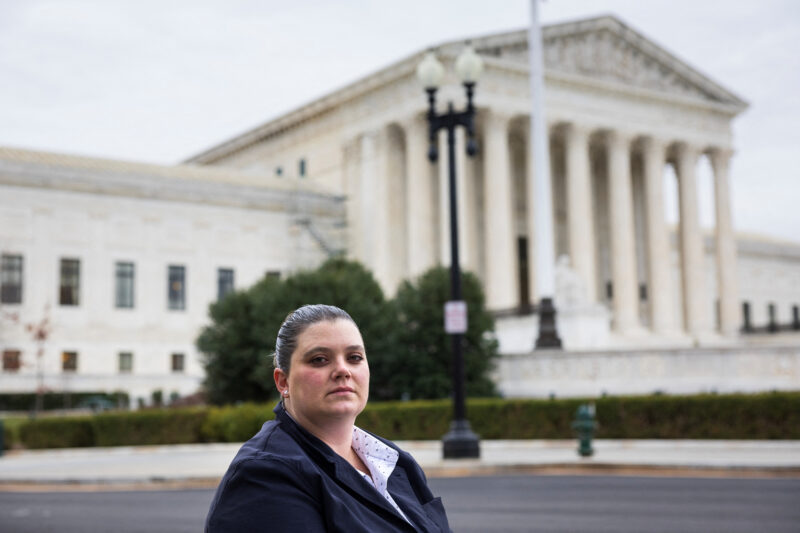WASHINGTON (Reuters) – Shanna Hayes in 2007 became the first member of her immediate family to attend college. She did not realize she was setting off on a path toward another, less-welcome family first – racking up more than $150,000 in student debt.
“At no point did I actually have that conversation,” Hayes said, referring to her lack of financial planning before enrolling at New England College in New Hampshire. “And to be honest, I didn’t ask.”
The finances of Hayes and millions of other Americans are in the hands of the U.S. Supreme Court as it hears arguments next Tuesday in appeals by President Joe Biden’s administration of lower court rulings blocking his plan announced last August to cancel $430 billion in student debt.
Legal experts said Biden’s program, intended to ease the financial burden on debt-saddled college-educated Americans like Hayes but criticized by Republicans as an overreach of his authority, may be scrutinized by the court under the so-called major questions doctrine. Its 6-3 conservative majority has employed this muscular judicial approach to invalidate major Biden policies deemed lacking clear congressional authorization.
Hayes, 34, said she plans to join a rally outside the court on Tuesday supporting Biden’s plan. The Alexandria, Virginia resident earned an undergraduate degree in mathematics and taught high school math before obtaining graduate degrees in higher education administration and sports management at Southern New Hampshire University, where she went on to work in various roles supporting students. She is now seeking a job promoting higher education access and equity.
The major questions doctrine is an outgrowth of an approach favored by many conservatives and business groups to curb what they call the excesses of the “administrative state.” They object to what they see as accumulated power by the U.S. government’s executive branch without proper checks by the courts and Congress.
The conservative justices already have shown skepticism toward giving deference to federal agency decisions.
“It now looms over any big agency action that the administration wants to do,” University of San Diego law professor Mila Sohoni said of the major questions doctrine. “The doctrine allows courts a great deal of leeway to pick and choose which agency actions to strike down and which to sustain.”
$1.6 TRILLION DEBT
About 45 million U.S. borrowers hold $1.6 trillion in federal student loan debt, with the typical undergraduate finishing college with $25,000 in debt, according to White House figures.
Many borrowers experienced financial strain during the COVID-19 pandemic. Beginning in 2020, the administrations of President Donald Trump, a Republican, and Biden, a Democrat, repeatedly paused federal student loan payments and halted interest from accruing.
Both administrations relied upon a 2003 federal law called the Higher Education Relief Opportunities for Students Act, or HEROES Act, that allows student loan debt relief during wartime or national emergencies.
Biden relied upon the HEROES Act when he unveiled plans to cancel up to $10,000 in federal student debt for Americans making under $125,000 and $20,000 for recipients of Pell grants awarded to students from lower-income families.
The program drew swift legal challenges. Two lawsuits – one by six conservative-leaning states and the other by two student loan borrowers who opposed the plan’s eligibility requirements – prompted lower courts to block it.
In the case brought by individual borrowers, Texas-based U.S. District Judge Mark Pittman, a Trump appointee, in November found the plan violated the major questions doctrine – a ruling that the New Orleans-based 5th U.S. Circuit Court of Appeals declined to put on hold pending appeal.
‘INSUFFICIENT FUNDS’
The major questions doctrine gives judges broad discretion to invalidate executive agency actions unless Congress clearly authorized them in legislation. Sohoni said a policy being blocked under the major questions doctrine was like “an agency trying to cash a check and the court saying, ‘No, you’ve got insufficient funds.'”
The justices used the doctrine since Biden took office in 2021 to block the U.S. Centers for Disease Control and Prevention from extending eviction protections for cash-strapped residential renters, stymie his COVID-19 vaccination-or-testing mandate for large businesses and restrict the Environmental Protection Agency’s power to regulate carbon emissions from power plants.
Chief Justice John Roberts, writing in the EPA ruling, said the major questions doctrine “developed over a series of significant cases, all addressing a particular and recurring problem: agencies asserting highly consequential power beyond what Congress could reasonably be understood to have granted.”
Student borrowers hope their stories are not overlooked. For Hayes, Biden’s loan forgiveness would enable her to buy a home.
“It will be the difference between us being able to include both of our incomes on a new place or only my wife’s income,” Hayes said. “As we look ahead for what’s to come, it will directly impact how we are able to live.”
(Reporting by John Kruzel; Editing by Will Dunham and Scott Malone)

